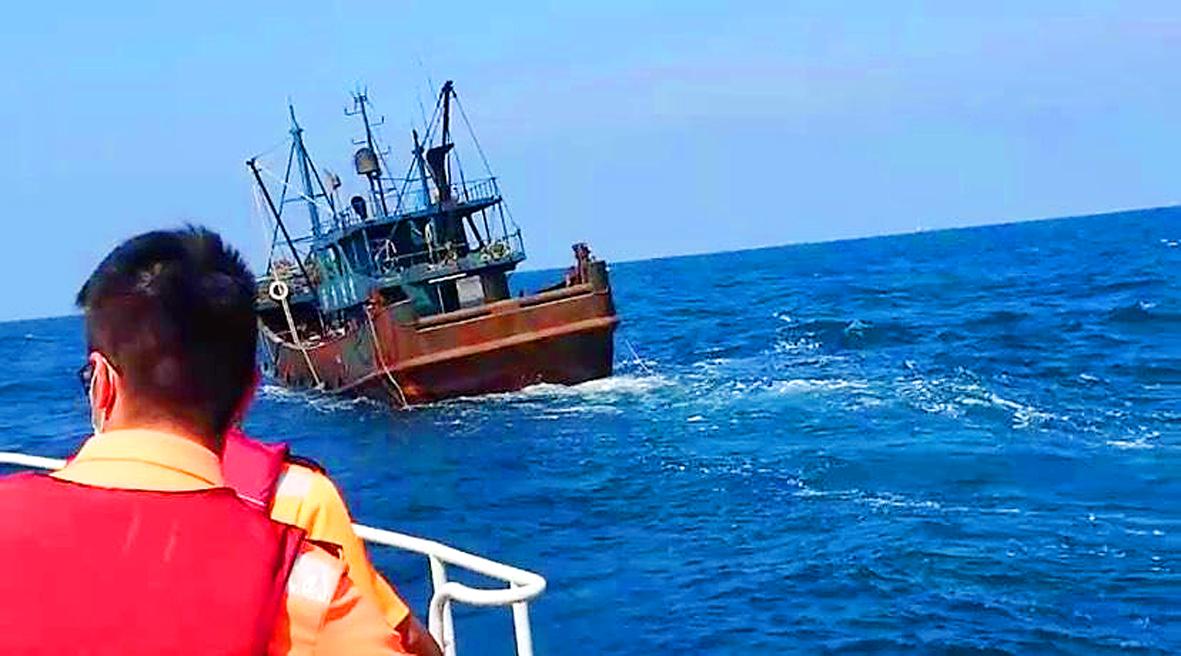Lawmakers across party lines proposed to allocate a portion of the fines imposed on Chinese vessels found trespassing in Taiwanese waters to the Coast Guard Administration (CGA), as part of efforts to boost the morale of officials at the agency.
Amid increasing incidents of Chinese vessels fishing and mining sand in the nation’s territorial waters, the lawmakers proposed amending the Act Governing Relations Between the People of the Taiwan Area and the Mainland Area (兩岸人民關係條例) and redirect such funds to the CGA to cover operational costs and performance bonuses.
The proposal was made by Democratic Progressive Party (DPP) legislators Yang Yao (楊曜) and Liu Chien-kuo (劉建國), Chinese Nationalist Party (KMT) legislators Chen Hsuen-sheng (陳雪生) and Chen Yu-jen (陳玉珍), and Independent Legislator Chao Cheng-yu (趙正宇).

Photo courtesy of the Coast Guard Administration’s Penghu Branch
The number of vessels intercepted by the CGA over the past three years totaled 3,803, including 290 ships seized and 81 confiscated, the lawmakers said.
A total of 194 ships were fined during the period, with fines totaling NT$193.2 million (US$6.69 million at the current rate), it added.
All of the funds were directed to the public treasury per the Act Governing the Allocation of Government Revenues and Expenditures (財政收支劃分法), the proposal said, adding that the CGA should also profit.
The budget allocated to the agency to patrol the nation’s territorial waters was NT$5.52 million from 2018 to last year, while the agency spent NT$5.86 million, the proposal said.
Article 80 of the allocation act should be amended to redirect part of the fines to agency, to partly cover the costs of its patrol missions, the proposal said.
The coast guard’s tasks are energy-consuming and dangerous, as it often has to deal with strong opposition from the crew on board the vessels found trespassing, the lawmakers said, adding that the amendment would also improve the agency’s human-resources situation.

Taiwan is stepping up plans to create self-sufficient supply chains for combat drones and increase foreign orders from the US to counter China’s numerical superiority, a defense official said on Saturday. Commenting on condition of anonymity, the official said the nation’s armed forces are in agreement with US Admiral Samuel Paparo’s assessment that Taiwan’s military must be prepared to turn the nation’s waters into a “hellscape” for the Chinese People’s Liberation Army (PLA). Paparo, the commander of the US Indo-Pacific Command, reiterated the concept during a Congressional hearing in Washington on Wednesday. He first coined the term in a security conference last

Prosecutors today declined to say who was questioned regarding alleged forgery on petitions to recall Democratic Progressive Party (DPP) legislators, after Chinese-language media earlier reported that members of the Chinese Nationalist Party (KMT) Youth League were brought in for questioning. The Ministry of Justice Investigation Bureau confirmed that two people had been questioned, but did not disclose any further information about the ongoing investigation. KMT Youth League members Lee Hsiao-liang (李孝亮) and Liu Szu-yin (劉思吟) — who are leading the effort to recall DPP caucus chief executive Rosalia Wu (吳思瑤) and Legislator Wu Pei-yi (吳沛憶) — both posted on Facebook saying: “I

The Ministry of Economic Affairs has fined Taobao NT$1.2 million (US$36,912) for advertisements that exceed its approved business scope, requiring the Chinese e-commerce platform to make corrections in the first half of this year or its license may be revoked. Lawmakers have called for stricter enforcement of Chinese e-commerce platforms and measures to prevent China from laundering its goods through Taiwan in response to US President Donald Trump’s heavy tariffs on China. The Legislative Yuan’s Finance Committee met today to discuss policies to prevent China from dumping goods in Taiwan, inviting government agencies to report. Democratic Progressive Party Legislator Kuo Kuo-wen (郭國文) said

Sung Chien-liang (宋建樑), who led efforts to recall Democratic Progressive Party (DPP) Legislator Lee Kun-cheng (李坤城), was released on bail of NT$80,000 today amid outcry over his decision to wear a Nazi armband to questioning the night before. Sung arrived at the New Taipei District Prosecutors’ Office for questioning in a recall petition forgery case last night wearing a red armband bearing a swastika, carrying a copy of Adolf Hitler’s Mein Kampf and giving a Nazi salute. Sung left the building at 1:15am without the armband and covering the book with his coat. Lee said today that this is a serious